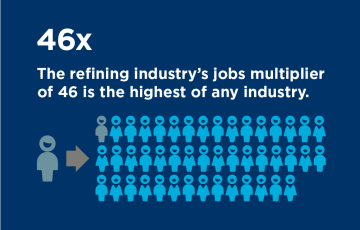America’s refining and petrochemical community employs and supports over three million people, hiring individuals from all education levels to fill a wide range of positions (such as welders, electricians, chemists, and engineers). The industry is experiencing a strong need for new technically-skilled employees as a result of the increased domestic production of shale oil and natural gas. Demand for skilled workers will only grow in the coming decade as a generation of workers retires.
On May 17, the House Committee on Education & the Workforce unanimously approved the “Strengthening Career and Technical Education Act for the 21st Century Act” (H.R. 2353). Prior to the markup, AFPM voiced its support for reauthorization of the Perkins Act—alongside 36 other trade associations and individual companies—in a letter the Jobs and Careers Coalition sent to Capitol Hill last week.
H.R. 2353 would reauthorize and improve the Carl D. Perkins Career and Technical Education Act of 2006. To align career education with in-demand jobs, the Act facilitates deeper collaboration between educational institutions, businesses, and industry. Importantly, the bill streamlines secondary and postsecondary performance measures used to evaluate CTE programs in order to ensure that taxpayer dollars are being used appropriately to improve said programs and that students are prepared to either continue their education or enter the workforce. H.R. 2353 will also enable CTE programs to meet the needs of states, regions, and local labor markets. It is anticipated that the House will vote on this measure in June.
The Senate Committee on Health, Education, Labor, and Pensions has yet to introduce their Perkins reauthorization legislation, as policy development is still ongoing. It is likely the upper chamber will begin to move their bill forward later this summer.
Reauthorization of the Perkins Act will not only help ensure that our nation’s students are equipped with the skills needed to enter the workforce, but will specifically foster career growth in the refining and petrochemical sectors. Workforce development is an issue that impacts all companies in our industries, either directly or indirectly. We must continue to shine the spotlight on improving CTE and take immediate action to strengthen workforce development programs for today, tomorrow, and the future.


